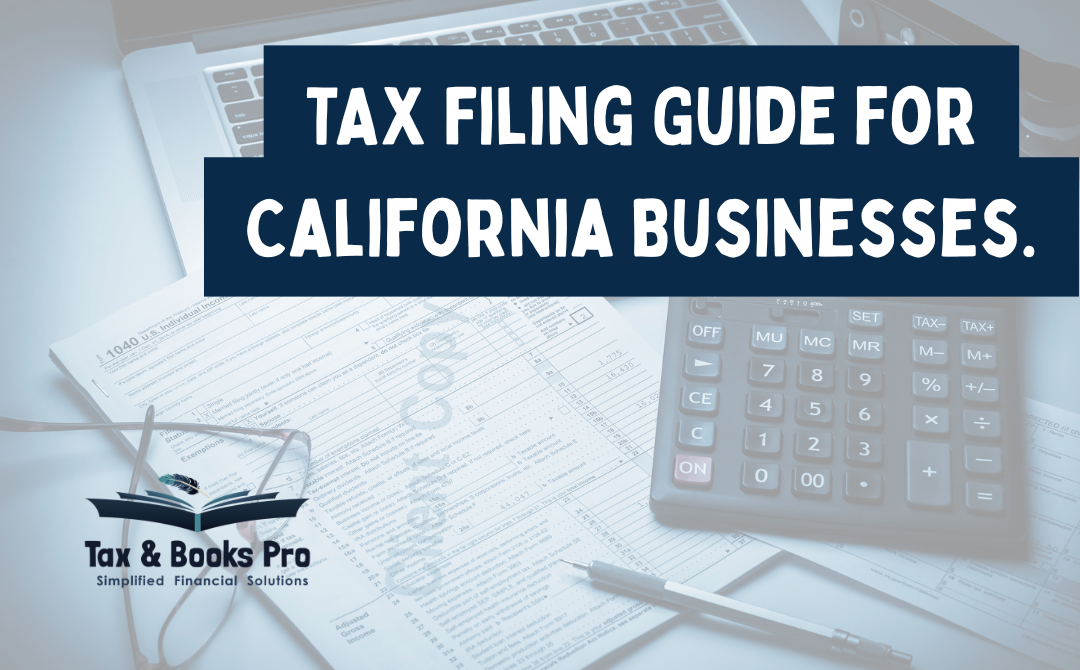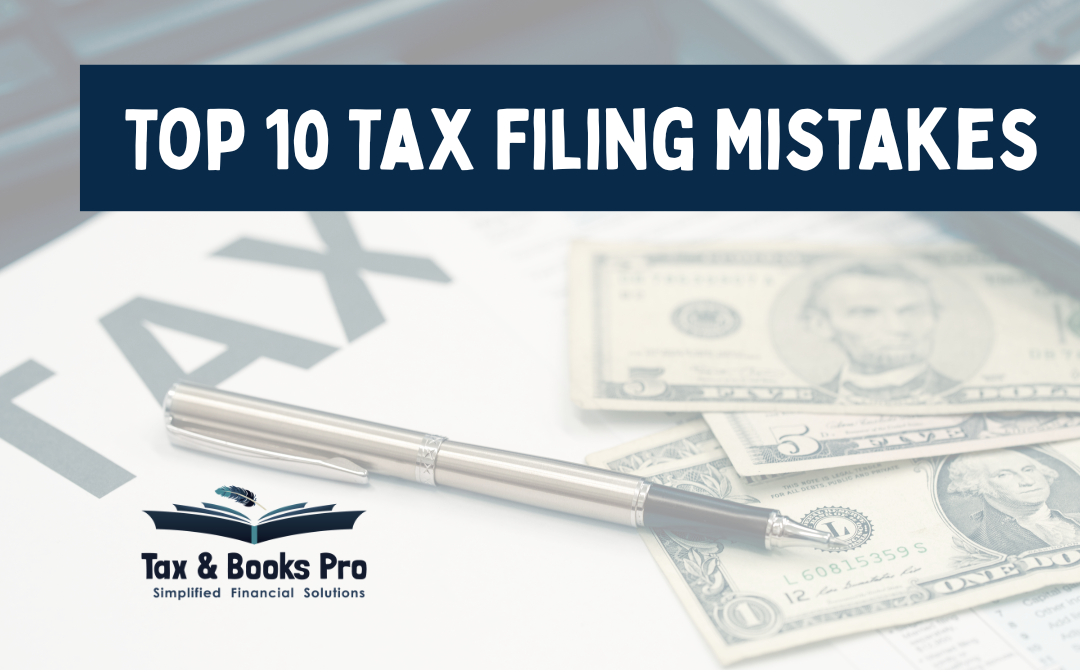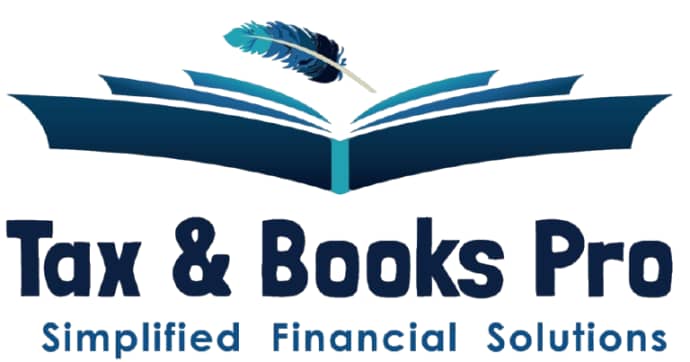Filing business taxes in California can be a daunting process—especially for small businesses, LLCs, startups, and self-employed professionals navigating complex regulations and multiple tax agencies. Whether you’re just starting or have been running a business for years, it’s critical to stay informed and compliant.
As a trusted IRS Certified Enrolled Agent in Sacramento, Tax & Books Pro has helped hundreds of local business owners stay ahead of tax obligations while maximizing deductions and avoiding costly mistakes. Here are 10 essential things to consider when filing business taxes in California.
1. Understand Your Business Structure and Tax Obligations
Your business structure—whether it’s an LLC, S Corporation, C Corporation, Partnership, or Sole Proprietor—directly impacts your tax filing requirements, forms, deadlines, and tax rates.
- Sole Proprietors and Single-Member LLCs typically report business income on Schedule C of their personal tax return.
- Partnerships and Multi-Member LLCs must file Form 565 and provide Schedule K-1s to partners.
- S Corporations file Form 100S and must issue K-1s to shareholders.
- C Corporations file Form 100 and are taxed at the entity level.
All corporations, LLCs, and partnerships doing business in California—or earning income from within the state—must pay state business taxes, regardless of profit.
If you’re unsure of your obligations, our business tax service in Sacramento includes personalized guidance based on your business structure.
2. Keep Track of Key Tax Deadlines
Missing a deadline can mean penalties and interest. Here’s what you need to know:
- S Corporations and Partnerships: Returns are due on the 15th day of the 3rd month after the close of your tax year. For most businesses on a calendar year, that’s March 17, 2025.
- C Corporations: Due on the 15th day of the 4th month—April 15, 2025 for calendar-year filers.
- LLCs and Partnerships: Typically follow the same deadlines as S Corporations.
California offers automatic extensions for filing, but taxes owed must be paid by the original deadline to avoid penalties.
3. Don’t Overlook the Minimum Franchise Tax
Most businesses operating in California—including LLCs and corporations—must pay an $800 minimum franchise tax annually, even if no income is earned.
- Exception: C Corporations are exempt in their first taxable year.
This fee is enforced by the Franchise Tax Board (FTB) and must be budgeted for, especially by startups or early-stage companies.
4. Know Which Tax Agencies to File With
Filing business taxes in California often means dealing with multiple agencies, depending on your operations:
- Franchise Tax Board (FTB) – for income and franchise taxes
- Employment Development Department (EDD) – for payroll taxes
- California Department of Tax and Fee Administration (CDTFA) – for sales and use taxes
Each department has its own forms, deadlines, and online portals. Failing to comply with any of them can lead to fines or business license issues.
Let Tax & Books Pro handle your filings with all agencies through our payroll tax service in Sacramento and bookkeeping and accounting service in Sacramento.
5. Take Advantage of Business Tax Credits and Incentives
California offers several credits that can reduce your state tax liability:
- R&D Tax Credit – for companies investing in innovation and development
- California Competes Tax Credit (CCTC) – for expanding and hiring in California
- New Employment Credit – for hiring employees in specific geographic areas
These credits can significantly lower your tax burden, but eligibility depends on factors like business activity, size, and location.
Ask us about specialized tax planning and advisory services to help you qualify.
6. Keep Accurate Records and Documentation
Maintaining clear and complete financial records is crucial—not just for compliance, but also to support deductions, credits, and audits.
You should track:
- Business income and receipts
- Operating expenses and vendor payments
- Payroll records and employee documents
- Bank statements and reconciliations
Our bookkeeping and accounting service in Sacramento ensures you’re always ready for tax season—or an audit.
7. Use California’s E-File Options
California supports electronic filing for most business tax forms, making it easier and more secure to file:
- Reduces paper clutter
- Helps avoid mailing delays
- Offers faster confirmation and refund processing
At Tax & Books Pro, we handle all business filings electronically for accuracy and speed.
8. Consider Local Tax Obligations
In addition to state and federal taxes, businesses may also be subject to local taxes, including:
- City business licenses
- Gross receipts taxes
- Local sales taxes
- Special district assessments
Sacramento-based businesses should check with the City of Sacramento’s finance department or work with a certified accountant in Sacramento for guidance.
9. Make Quarterly Estimated Tax Payments
Businesses that expect to owe more than $500 (corporations) or $1,000 (individuals/LLCs) in state tax must make quarterly estimated payments to avoid penalties.
These are generally due:
- April 15
- June 15
- September 15
- January 15 (of the following year)
We provide tax service for small business clients to accurately calculate and file these payments on time.
10. Work With a Certified Tax Professional
California’s business tax landscape is intricate and changes often. From entity structuring to deduction strategies and compliance, a knowledgeable advisor can help you reduce tax liability and avoid costly mistakes.
Our team of IRS certified enrolled agents in Sacramento has over 5 years of experience helping businesses like yours thrive through personalized tax strategies.
Conclusion
Filing business taxes in California isn’t just about meeting deadlines—it’s about planning, organizing, and making smart financial decisions. With the right partner, you can stay compliant, reduce taxes, and focus on growing your business.
📞 Schedule a consultation with Tax & Books Pro today to learn how our LLC tax preparation in Sacramento, business tax service, and bookkeeping support can help your business thrive.





One Response
Hi, this is a comment.
To get started with moderating, editing, and deleting comments, please visit the Comments screen in the dashboard.
Commenter avatars come from Gravatar.